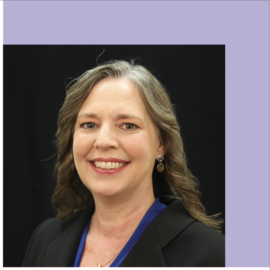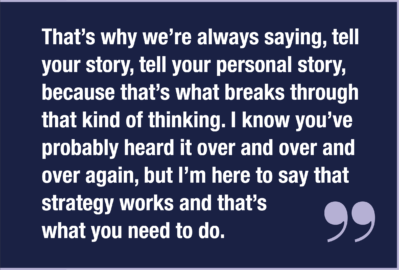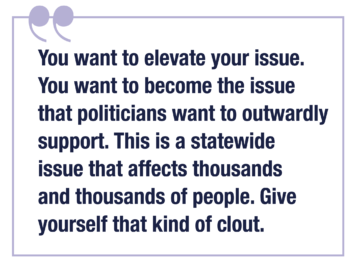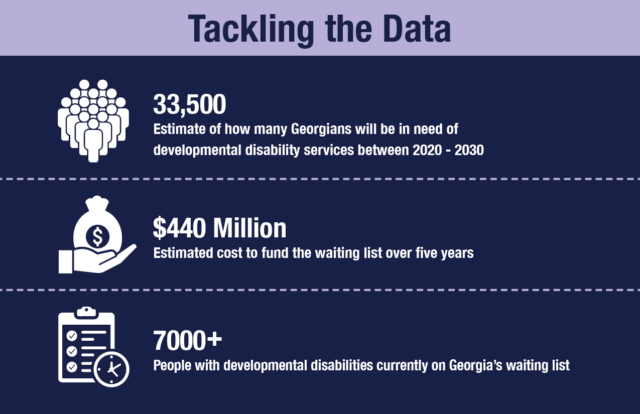Featuring Georgia Senator Sally Harrell
The Georgia Council on Developmental Disabilities recently sat down with Senator Sally Harrell (D-40) to discuss Senate Bill 208 that proposes to fully fund the NOW/COMP Waivers waiting list which is currently over 7,000+. As the 2022 legislative session begins, Senator Harrell discusses why the bill is important, how it aims to help the families, and why legislators need to hear personal stories to make sure they know what is important to people who vote for them.
Senator Sally Harrell (SH): I represent State Senate District 40, which includes the cities of Dunwoody, Sandy Springs, Peachtree Corners, Brookhaven, Doraville, Chamblee, some of unincorporated DeKalb County around Tucker and a little bit of the City of Atlanta. And, I was elected to the Senate in 2018, so I’m finishing my second term. Previous to that, I served in the Georgia House from 1999 to 2005. I took some time off in between to raise my kids.

GCDD : What has been your experience being back in the Georgia General Assembly, serving a very large district with very prominent cities that are growing very fast?
SH: It is a large district. We just went through redistricting. And, every Senate district is now supposed to be about 191,000 people. Whereas House districts are running about 60,000 people right now. A Senate district is about three times as big as a House district. And when you compare it to congressional districts, Senate districts are about one quarter of the size of congressional districts, meaning congressional districts are huge.
I’ve enjoyed serving in the Senate. It’s fewer people – there’s 56 senators – whereas in the House, there are 180 representatives. It’s a little bit more of an intimate experience in the Senate in that you have fewer colleagues and you get to know them a little bit better. There are a couple of things that are different about serving in the Senate versus the House. We have to be more of a team player in the Senate because you’ve got this small group of people you’re working with and everybody has to play a role.
GCDD: As you may know, the focus of the Georgia Council on Developmental Disabilities is to serve people with intellectual/developmental disabilities across Georgia. And specifically we wanted to talk about Senate Bill 208. But before we go into that, we want to know how this bill came about?
SH: Sure, Senate Bill 208 is actually my bill. I authored the bill. The reason I was motivated to author Senate Bill 208 is because when I served in the House years ago, that was when the Olmstead decision was made, which started a campaign called Unlock the Waiting List. And so I was there when that started, when there was the first waiting list for community services. And I remember being very involved in that at the time, and I was actually pregnant with my first baby. I was hearing stories from the disability community for the first time when I was pregnant and it made a huge impact on me because I knew that this too could be my story – that anyone can have a child that lives with a disability. And I’ll be honest, it scared me. But it also made the stories very impactful so that I never forgot. When I came back to the Senate and my kids were almost grown and I found out that that waiting list was still there, I was heartbroken. And I just knew that I had to do something about that, I had to continue the work that I had started so many years ago. I used the resources at the Georgia State Capitol. I talked to people, got updates about what was different now about the waivers, and determined the best way forward was to eliminate the waiting list year by year, by advocating for appropriations in the budget so that the waiting list would go away in five years.
I had actually heard this idea stated by the Department of Behavioral Health and Developmental Disabilities (DBHDD) – they presented this plan in their budget hearing. So really the bill is just a replication of the department’s plan in order to further support what the department already wants to do.
GCDD: Part of your bill brings in the expansion of the population. You’re projecting that there’s going to be 33,500 individuals between 2020 or early 2021 and 2030 who will be requiring services, in addition to everyone who’s already there. So before we get into the other parts of the bill, how did you come to that number? How does that get defined?
SH: Sure. In a bill, it’s a good idea to write a kind of a “Whereas” section at the beginning of the bill that provides the data to justify why you’re presenting a particular policy solution. In getting ready to draft the bill, I went to the research office and asked them about future needs and future population projections. Writing a bill is a team effort.
You’ve got the research team, you’ve got the Office of Legislative Council who are the lawyers who write the wording of the bill, because I’m not a lawyer. There’s a whole team of people who go into writing the bill. And then of course, there’s the author who carries the bill through the process, and the co-sponsors who signed onto the bill to give the bill support.
GCDD: There’s very specific language in it talking about providing appropriations to really take care of the entire waiting list, which is right now at 7,000+. Can we dive into that part of the bill? What does that look like in terms of implementation and what that means for people with disabilities and their families and Georgians in general?
SH: Part of the problem and the reason we still have a waiting list is because in each state budget, there are only about 100 slots that are funded. And so obviously if you have a waiting list of six or 7,000 people, and you’re only funding 100 at a time, you’re never going to work through that waiting list. What I was told was that in order to come to the top of the waiting list, you pretty much had to have some sort of family emergency because there is some triage involved in it. I think they actually like to call it a planning list instead of a waiting list. I think waiting is more appropriate because that’s what people are doing, but there is some planning involved in that they’re triaging. If you have a family emergency, then you have a chance of going to the top of the list. And what I was told by families is that it pretty much takes having an emergency in order to get one of those slots. That’s unacceptable to me.
What would happen under the bill if you’re going to fund the waiting list in five years, you’re looking at funding more like 1,800 slots per year, instead of 100. That’s a big budget appropriation. To me, it is appropriate because caring for these families is a role of the government. That should be one of the top roles of government because the needs cost too much. The expenses are too high for almost every family to be able to manage alone. So that’s when society comes in to help and the most efficient way of doing that is through government. To me, it’s an appropriation that is totally justifiable. Not all my colleagues agree with that, but to me, spending that kind of money is what the government is there for, because it’s a collective expense.
GCDD: This bill would be attempting to get rid of the current waiting list and get everybody who is on there the services they need. How does the bill address the needs of people who are not yet on the waiting list, but who may have needs that arise later?
SH: The thought is that if you include more people, 1,800 people instead of 100 people for the next five years, then for anyone who comes on later, the finances of that are going to be much more manageable because there won’t be as many people. You’re looking at a larger appropriation for the next five years, but after that, you’re kind of playing catch up. The number of people that would be coming on would be much more affordable and there just wouldn’t be an issue. They just roll on.
GCDD: In other words, people can now get the services they would need almost immediately or not have to wait a certain amount of years as opposed to maybe a few months or a few weeks.
GCDD: Community living and community supports are exactly what you’re aiming to accomplish with this bill citing Olmstead and the Americans with Disabilities Act as its foundation. However, there is a DSP crisis – a shortage of direct support professionals. Once people are at home, there is that need for supports and services at home. So on one side, this bill is aiming to solve a very huge problem in Georgia, but then there is another issue. As we start to move the waiting list and get people the services they need, how does that work with the DSP crisis?
SH: I think there might be two questions, one maybe that people need different levels of service and how to handle that. And then the other part of that is the question about whether there’s a shortage of providers and pay is too low.
Senate Bill 208 really more addresses the first part of that. Although I think it might have the effect of helping to solve the second part kind of incidentally, there was an issue about the families. I think there are 133 families that do require 24-hour in-home support. And there was an attempt to cut that number of hours down to I think 16, which would free up money that could then be used to pay for more waiver slots. I have always been opposed to that as are most people that I hear from in the disabilities community because you’re kind of like taking from one group to help another, which doesn’t seem appropriate.
And from my personal experience, when I was caring for my dad who was at the end stages of life, my mother had long-term care insurance, but it only covered 12 hours instead of 24. She couldn’t bring him home because there was no way she could afford that other 12. Likewise, with these families, most of them can’t afford to fill the gap. That was going to push these people into institutions and that is against the Olmstead decision. I definitely never supported that scenario. Fortunately, as of this week, that issue seems to have been solved through federal legislation and they aren’t allowing those hours to be capped. And so the capping of those hours for those families has been removed from the state application. That’s good news. Georgia has enough money to help every family. It’s just that we have to ensure that Georgia has the political will to help every family.
GCDD: That’s a great segue into our next question. You were talking about how you wanted to make a difference and you have constituents. How can people get involved in that political will? As the new legislative session kicks off in January, what can people do to get involved?
SH: In order to sway an issue like this that’s been sitting there unchanged for 20 years, you have to create pressure on multiple levels. You need to create pressure on the Governor’s office and on DBHDD. Those two things are connected because the Governor is over that department; but you also need to create pressure through legislative advocacy. We need people to be aware of Senate Bill 208. We need people to contact their legislators about Senate Bill 208.
When you approach a legislator, don’t assume they know about it – assume they don’t know about it, and educate them from the very beginning. When I spoke about Senate Bill 208 from the front of the Senate chamber, the Senate was getting ready to pass a rather small tax cut. It was a tax cut that might’ve put $40 or $50 into the pockets of Georgians, not enough money that a lot of Georgians were even going to notice, but the total price tag was $440 million. When I calculated what it would take for Georgia to fund the waiting list for five years, it came out to be exactly $440 million, which just killed me because it’s like, just don’t do this tax cut and fund this waiting list. Unfortunately, it caused quite an amount of backlash, because the people who were proposing the tax cut thought that everyone would get behind a tax cut. And I got a lot of people to not support the tax cut. We need to educate legislators to understand that the cost of caring for a child or an adult child who’s living with disabilities is equivalent to paying for college for that person’s entire life. When you say it that way, you realize that it’s beyond the means of most families.
That’s why we’re always saying, tell your story, tell your personal story, because that’s what breaks through that kind of thinking. I know you’ve probably heard it over and over and over again, but I’m here to say that strategy works and that’s what you need to do. You just need to reach out to your legislator. You need to tell your story. Perhaps your legislator is already supportive and already knows your story. Reach out to another one, reach out to somebody that you don’t know if you can get through to them.
GCDD: What are the top three things you want people to know about SB 208 to use for their advocacy?
SH: When we did our press conference in Spring 2021, we developed the tagline “Fully funded in five.” It’s important to repeat that messaging, “Fully funded in five.” Repeat those because that’s the way brains work. If they hear the same thing, at least six or seven times they’ll remember it. So just repeating that phrase is probably the most important thing. And, repeat the number of people who are on the waiting list, which last spring was over 7,000.
GCDD: To clarify and confirm, and it might change, you said that to fully fund the waiting lists, it would cost $440 million.
SH: Yes, it would cost $440 million over five years, and I based that on the last budget they put in for $2 million for 100 slots, so that’s $20,000 a slot. That’s what it costs the state for one year.
GCDD: 2022 is Election Season. We have a Governor’s race coming up, along with local legislators, and everything in between. This is definitely an important year for disability voters to get in and make sure their voices are heard. Legislative advocacy is a very big deal. Is there anything specific you’d want to make sure that our readers, our audience should know, should talk about, knowing that the power is really in their hands, with their vote?
SH: You notice that in governor’s races, there’s a lot of talking about teachers and increasing teacher’s salaries or giving teachers bonuses. That’s because the gubernatorial candidates understand that teachers are a large voting block. You want to create the same impression, which is why you need to be calling lots of legislators and telling your story because you are part of that voting block (and so are your aunts and uncles and your grandparents- your whole extended family who raises this person who lives with disabilities). Think about all the people that are involved in that person’s life – they’re all voters. You want to elevate your issue. You want to become the issue that politicians want to outwardly support, because there are so many of you. This is a statewide issue that affects thousands and thousands of people. Give yourself that kind of clout.
I know when I was running and I met quite a number of families that had children or adult children living with disabilities, once they realized I was in their corner, they wanted to support me whether they were Republicans or Democrats. I could actually get votes from the other side, if I was supportive of this issue. It’s one of those truly bipartisan issues out there that if a gubernatorial candidate is a Republican and supportive of this issue, then you might just draw in votes from the other party or vice versa. I say all the time, you’ve got to be loud enough to give the legislators or the gubernatorial candidates the impression that you have huge numbers of voters in your corner.
GCDD: What is your hope for Georgians and especially what is your hope for Georgians with disabilities?
SH: Well, my hope is that we can make a seamless transition from the K-12 education system to living and being a productive citizen in the community. That’s where it’s breaking down. I’ve heard from so many parents that the K-12 school system has served their child so well. And the child has grown and developed and is doing really, really well. And then, because there’s not a smooth transition their adult child, by that point, often retreats into themselves because they’re not getting that stimulation.
That is every parent’s biggest fear that all the work they did is going to be lost when they finish the K-12 system. We need to work through this list in a way that the transition is absolutely seamless, so we don’t lose all of the investment that we’ve made for 22 years.
Read the bill: https://www.legis.ga.gov/legislation/59855

